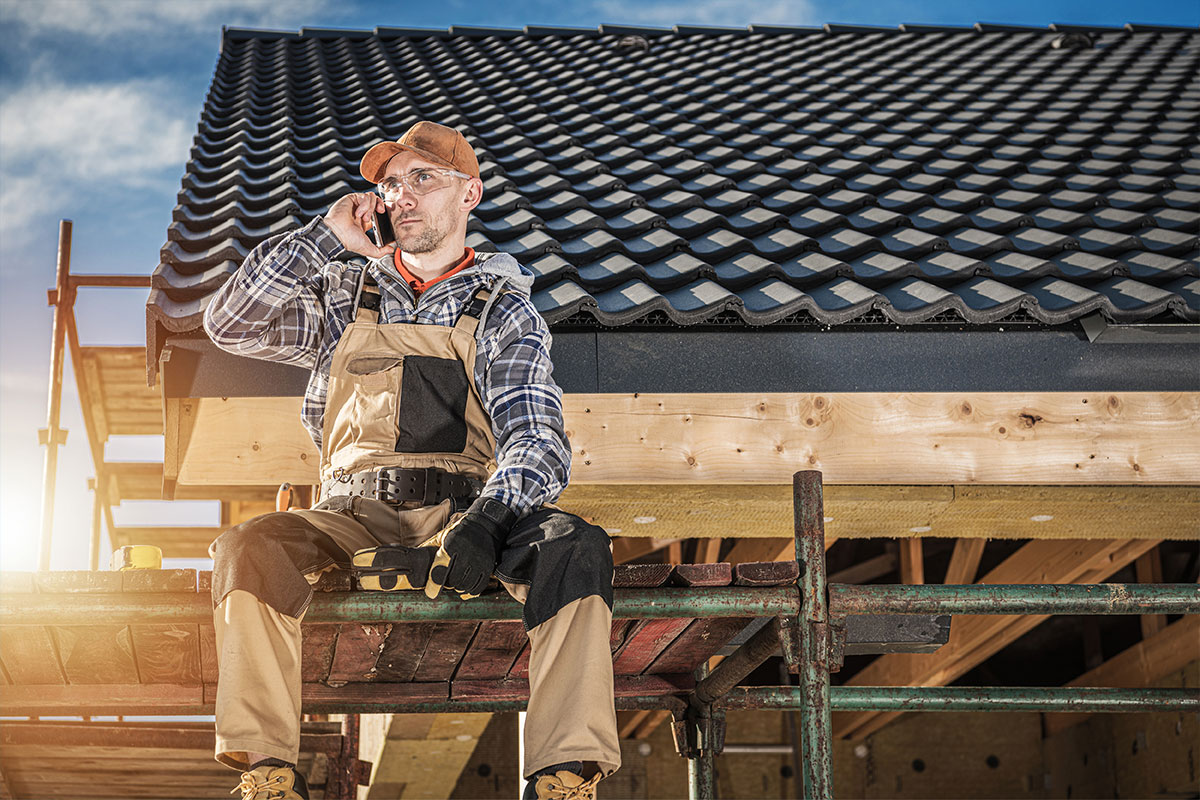
How to Choose the Best Roofing Contractor: 6 Essential Steps
Hiring a roofing contractor is an investment in the safety, value, and long-term durability of your home. With roof repairs and replacements carrying significant costs, making the wrong decision can result in wasted money, structural damage, and even legal issues. A new roof is one of the rare exterior home upgrades that offers a full return on investment, making it more crucial than ever.
For those wondering how to choose the best roofing contractor in Wappingers Falls, NY, here are the six actionable steps to help simplify the process.
Table of Contents
Key Takeaways
✔ Choosing a roofing contractor with a strong local reputation ensures better accountability, faster emergency response, and familiarity with local building codes.
✔ Verifying license, insurance, and bonding protects homeowners from legal and financial risks throughout the roofing project.
✔ Looking for manufacturer certifications and professional affiliations helps identify contractors who meet high standards for training and workmanship.
✔ Reviewing past work and customer feedback reveals the contractor’s consistency, reliability, and overall service quality.
✔ Understanding estimates and warranty details ensures transparency in pricing and long-term protection through documented coverage.
✔ Evaluating communication and professionalism early helps determine whether the contractor will manage your project with clarity and respect.

1. Start With Local, Reputable Roofing Companies
One of the most effective first steps in your search is to narrow your list to roofing contractors based in your area. Local companies bring several distinct advantages that national or out-of-town contractors often lack.
Understanding how to choose the best roofing contractor begins with identifying providers who are rooted in your community. When evaluating how to find roofing contractor options, always favor businesses that know your community, have local reviews to prove their quality, and can provide in-person support when needed.
Why Local Matters
- Honors Warranties: A contractor located nearby is easier to reach if issues arise after the project is completed. You’re less likely to be ignored or delayed when warranty claims or touch-ups are needed.
- Understands Local Permitting and Zoning Regulations: Roofing codes can vary by city or county. A contractor who works in your area regularly will know exactly what’s required for permits, inspections, and compliance.
- Responds Quickly in Emergencies: If you’re dealing with storm damage or a roof leak, a local contractor can assess the situation and begin repairs much faster than an out-of-town team.
- Maintains Better Community Accountability: Local companies rely on reviews, recommendations, and local relationships to stay in business. Their long-term success depends on your satisfaction.
How to Identify Reputable Local Roofing Contractors
- Search Beyond Google Ads: Many homeowners wondering how to choose a good roofing contractor get misled by paid listings at the top of search results. These may feature large franchises with no actual presence in your town. Instead, scroll further down to find companies with local addresses and phone numbers.
- Check Community-Based Platforms: Look for recommendations in Facebook neighborhood groups, Nextdoor forums, local Reddit threads, and city or town business directories.
- Drive Through Your Neighborhood: If nearby homes are undergoing roof replacements, stop and ask the homeowners about their experience. Contractors working on visible, current jobs are often open to taking on new projects and demonstrating their work quality in real time.
- Visit Their Physical Location: A reputable roofing contractor should have a verifiable office—not just a P.O. box or virtual address. This is a critical tip for those trying to figure out how to find roofing contractor businesses that are truly local and not fly-by-night operations.
- Look For a Track Record of Local Work: Ask potential contractors how long they’ve worked in your region. Those with five or more years in business locally tend to be more stable and familiar with environmental roofing needs such as snow load requirements or hurricane preparations.

2. Verify License, Insurance, and Bonding
When determining how to choose the best roofing contractor, never skip the verification of legal credentials. These documents protect your property, your finances, and your peace of mind. If you’re serious about how to choose a good roofing contractor, confirm these details before any work begins.
What to Check and Why It Matters
- State-Issued Contractor’s License: A valid state license shows the contractor has met minimum training, knowledge, and experience requirements. It also means they are recognized by local authorities and are operating legally under current building regulations.
- General Liability Insurance: This protects your home in case the contractor accidentally damages your property while on the job. Without it, you’re financially responsible for any necessary repairs caused by the roofer’s work.
- Workers’ Compensation Insurance: If a crew member is injured while working on your property, this insurance ensures the contractor, not you, covers medical bills and lost wages. It prevents legal disputes and unexpected liabilities.
- Surety Bonding: Bonding gives homeowners financial protection if the contractor fails to fulfill the terms of the agreement. This can include subpar work, incomplete projects, or contract abandonment.
How to Confirm These Credentials
- Ask the contractor for physical or digital copies of their license, insurance, and bond certificates.
- Use your state’s licensing board to confirm the license is valid and current.
- Call the insurance provider listed on the documents to verify coverage.
- Request the name of the bonding company and bond number to confirm legitimacy.
3. Look for Manufacturer Certifications and Professional Affiliations
While licenses and insurance are required, manufacturer certifications and professional memberships are earned. For those figuring out how to choose a good roofing contractor, these trust indicators make it easier to separate reliable professionals from opportunistic contractors. When it comes to finding roofing contractor candidates you can rely on, certifications and memberships are proof that a contractor isn’t just licensed but invested in doing quality work.
Why Manufacturer Certifications Matter
- Shows Advanced Training: Manufacturers like GAF, Owens Corning, and CertainTeed certify roofers who complete rigorous product-specific training and meet strict installation standards.
- Enables Better Warranty Coverage: Certified contractors often provide extended or enhanced warranties that are only available through them. This gives homeowners more long-term protection and peace of mind.
- Reflects Product Expertise: Certified roofers are more likely to install materials correctly, maximizing product performance and lifespan.
Professional Affiliations to Look For
- National Roofing Contractors Association (NRCA): Membership in this national organization demonstrates a contractor’s commitment to continuing education, safety practices, and industry leadership.
- Better Business Bureau (BBB): Contractors with a good standing on the BBB have a track record of resolving customer complaints and maintaining transparent business practices.
- Local Business or Builder Associations: Affiliations with regional chambers of commerce or home builder networks reflect strong ties to the community and business accountability.
4. Review Past Work and Customer Feedback
Understanding how to choose the best roofing contractor involves examining real-world evidence of their capabilities. A contractor’s portfolio and reputation are among the strongest indicators of future performance. If you’re trying to figure out how to find roofing contractor feedback you can rely on, let real-world experience guide your decision.
How to Evaluate Past Work
- Request a Project Portfolio: A qualified contractor should offer before-and-after photos of past roofing jobs. This helps evaluate the quality, neatness, and consistency of their work.
- Visit Completed Homes: Ask for addresses of recent projects in your area. Drive by to see the finished roof in person. This gives you a tangible sense of the contractor’s standards.
- Look for Project Variety: A contractor who has experience with multiple roofing materials and styles, such as asphalt shingles, metal, or flat roofs, is more versatile and better equipped to meet your specific needs.
How to Analyze Customer Feedback
- Use Verified Review Platforms: Third-party sources like Google Reviews, Yelp, Angi, and the Better Business Bureau (BBB) provide unfiltered customer opinions. These platforms are more trustworthy than testimonials posted on the contractor’s own website.
- Identify Consistent Patterns: Look for repeated comments—positive or negative—about timeliness, professionalism, communication, and cleanup. These trends are more telling than isolated opinions.
- Pay Attention to Negative Reviews: Don’t automatically disqualify a contractor with a few negative reviews. Instead, examine how they respond. Respectful and solution-oriented replies suggest integrity and a customer-first approach, which is critical in how to choose a good roofing contractor.
- Check the Date of Reviews: Prioritize recent feedback. A contractor may have improved over time or, conversely, declined in quality. Timely reviews reflect their current service level.
- Ask for References: A reputable roofer should willingly provide contact information for past clients who can share their experience firsthand. Speaking with a previous customer gives you deeper insight into how the company operates.

5. Understand the Estimate and Warranty Details
Price alone shouldn’t dictate your decision. Anyone exploring how to choose the best roofing contractor must understand what they’re paying for—and how they’re protected afterward. Clear estimates and strong warranties are key indicators of professionalism. If you’re evaluating how to choose the best roofing contractor, look for full transparency.
What to Look for in a Roofing Estimate
- Detailed Material Information: The estimate should specify the brand, type, and quality of roofing materials. Generic terms like “shingles” or “membrane roofing” are too vague and can hide cost-cutting substitutions.
- Labor Breakdown: Look for a clear explanation of labor charges, including crew size, hourly rates (if applicable), and estimated work hours. This ensures you’re not overpaying or subject to ambiguous billing.
- Cleanup and Disposal Plan: A thorough contractor includes debris removal, dumpster fees, and job site cleanup in their bid. This prevents you from being left with a mess or unexpected costs after the job is done.
- Permit and Inspection Fees: Ensure that all local permitting and inspection costs are included. If not, clarify who is responsible. Permits are legally required and essential for code compliance.
- Project Timeline: The estimate should outline start and end dates, along with any factors that might cause delays (weather, material availability). This helps set realistic expectations and reduces disputes.
Understanding Roofing Warranties
- Manufacturer Warranty: This covers defects in the roofing materials themselves. Depending on the brand and installer’s certification, terms can range from 10 years to lifetime coverage. It’s a vital part of how to choose a good roofing contractor who stands behind the products they use.
- Workmanship Warranty: Offered by the contractor, this protects you if the roof fails due to improper installation. A solid workmanship warranty typically covers 5 to 10 years and demonstrates the contractor’s confidence in their skills.
- Written Documentation is Essential: Verbal promises are meaningless. Insist on warranties in writing, with specific coverage details, limitations, and steps for filing a claim. This is a critical safeguard in how to find roofing contractor transparency and accountability.
How to Compare Roofing Estimates
- Get Multiple Quotes: Collect at least three estimates from different contractors. This allows you to spot pricing anomalies and understand the range of market rates. Roofing contractors typically see profit margins between 20% and 40%, depending on factors such as company size, business age, and target market.
- Avoid the Lowest Bid Trap: An unusually low estimate often signals cut corners, cheap materials, or inexperience. Balance cost with the level of detail and warranty coverage provided.
- Clarify What’s Excluded: Some estimates intentionally omit items to appear more competitive. Ask what isn’t included—like flashing, gutter replacement, or plywood decking repairs—to avoid surprise charges.
6. Evaluate Communication and Professionalism
Before any contracts are signed or materials delivered, communication lays the groundwork for a successful roofing project. Homeowners looking into how to choose the best roofing contractor should pay close attention to how the contractor interacts from the very first contact. Understanding how to choose a good roofing contractor is about selecting someone who treats your project with the attention and clarity it deserves.

Signs of a Professional, Communicative Contractor
- Timely Responses: Contractors should return calls or emails promptly—ideally within 24 hours. Delays in response before the project begins are a warning sign for future communication breakdowns.
- Clear, Detailed Explanations: Good contractors explain roofing options, project phases, and cost breakdowns in simple terms. Avoid those who use jargon or brush off questions without clear answers.
- Punctuality: Showing up on time for consultations or inspections shows respect for your time and signals an organized, disciplined work ethic.
- Transparent Scheduling: A trustworthy contractor provides a realistic start and completion timeline and updates you if changes occur. Sudden no-shows or excuses may indicate poor planning or overbooking.
- Written Proposals and Follow-Ups: Look for detailed written estimates, proposals, and contracts that outline all terms. Professional roofers don’t rely on vague promises or handshake deals.
- Willingness to Address Concerns: Contractors should answer your questions openly, even if the answers aren’t what you hope to hear. Avoid contractors who become defensive or evasive when asked about delays, pricing, or procedures.
How to Assess Communication During the Consultation
- Ask Specific Questions: Inquire about installation methods, crew supervision, safety measures, warranty claims, and payment terms. A quality contractor will provide informative, structured answers.
- Observe Their Listening Skills: Pay attention to whether the contractor listens to your concerns and preferences or dominates the conversation with a one-size-fits-all pitch.
- Evaluate Their Follow-Through: Did they follow up after your initial inquiry? Did they send the promised documents or referrals on time? These small actions reveal a great deal about how they manage projects.
- Gauge Their Professionalism: Everything from their appearance to how they speak about other clients or competitors reveals their work ethic. If they cut corners in communication, they may do the same on your roof.
Frequently Asked Questions
A good roofer is licensed, insured, and has strong local references. They provide detailed estimates, clear timelines, and written warranties. Positive reviews and manufacturer certifications are also strong indicators of professionalism and reliability.
Ask about their licensing, insurance, and years of local experience. Request details on materials, warranties, project timelines, and cleanup procedures. Also, ask for references and examples of past work to gauge their quality and consistency.
Start by getting multiple quotes to understand market pricing. Be respectful but firm when discussing costs, and ask if there’s flexibility on pricing or materials. Focus on value rather than just the lowest price to avoid cutting corners.
Monitor how well they communicate, stay on schedule, and maintain a clean, safe worksite. Check the quality of workmanship and how they handle unexpected issues. Timely completion, minimal disruptions, and attention to detail are signs of strong performance.
Review the entire contract carefully, ensuring all materials, costs, timelines, and warranty terms are clearly listed. Confirm the contractor’s credentials and insurance coverage. Ask questions about anything unclear and don’t sign until you’re fully confident.

Ready to Hire Experts? Contact Roofer of Wappingers Falls LLC!
If you’re a homeowner in Wappingers Falls, NY, looking for reliable, high-quality roofing services, now is the time to act. Roofer of Wappingers Falls LLC is a trusted local contractor with a proven reputation for excellence in Wappingers Falls, NY. Our licensed and insured team provides transparent estimates, top-tier workmanship, and strong warranties that protect your investment.
Call Roofer of Wappingers Falls LLC today to schedule your estimate and experience roofing done right—locally and professionally!
